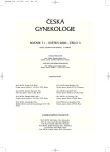Intrahepatic Cholestasis of Pregnancy – Four Case Reports
Cholestatická hepatóza těhotných žen – čtyři kazuistiky
Cíl studie:
Poukázat na roli zvýšených hladin žlučových kyselin a jaterních enzymů u cholestatické hepatózy těhotných žen (ICP). Literární přehled komplikací spojených s ICP.
Typ studie:
Kazuistika.
Název a sídlo pracoviště:
Gynekologicko-porodnické oddělení Krajské nemocnice Pardubice.
Předmět a metoda studie:
Autorka analyzuje čtyři případy významného zvýšení jaterních enzymů v pozdní graviditě. V souladu s literárními údaji uvádí doporučené postupy u ICP, které by zabránily komplikacím, jako je nitroděložní odúmrtí plodu, zvýšená incidence zkalené plodové vody a intolerance spontánního porodu plodem.
Závěr:
Zdá se, že příčinou fetální mortality je akutní anoxická ataka spíše než chronická placentární insuficience. Včasný porod je v indikovaných případech jedinou cestou, jak zabránit fetální ztrátě. Hladiny žlučových kyselin mohou pomoci klinikovi v rozhodování.
Klíčová slova:
cholestatická hepatóza těhotných žen, onemocnění jater, žlučové kyseliny, pruritus, gravidita
Authors:
Z. Kokrdová
Authors‘ workplace:
Gynekologicko-porodnické oddělení Krajské nemocnice Pardubice, primář MUDr. L. Hanousek
Published in:
Ceska Gynekol 2006; 71(3): 184-189
Category:
Original Article
Overview
Objective:
To draw attention to the role of elevated levels of bile acids and liver enzymes in intrahepatic cholestasis of pregnancy (ICP) on the course of pregnancy. Literary overview of the complications associated with ICP.
Design:
Case report.
Setting:
Department of Obstetrics and Gynecology, Regional Hospital, Pardubice.
Subjects and methods:
The author analyses four cases of highly elevated liver enzymes in late pregnancy.
Together with statements in literature she describes the recommendations for the best management of ICP to prevent poor fetal outcome including intrauterine fetal demise, increased incidence of meconiumstained amniotic fluid and fetal intolerance of labour.
Conclusion:
Fetal mortality appears to be secondary to acute anoxic events, rather than chronic uteroplacental insufficiency. Early delivery when indicated appears the only strategy currently demonstrated to improve outcomes. The levels of bile acids can help the clinicians to make the decision.
Key words:
intrahepatic cholestasis of pregnancy, liver disease, bile acids, pruritus, pregnancy
Labels
Paediatric gynaecology Gynaecology and obstetrics Reproduction medicineArticle was published in
Czech Gynaecology

2006 Issue 3
Most read in this issue
- Discrepancy of Ultrasound Biometric Parameters of the Head (HC - Head Circumference, BPD - Biparietal Diameter) and Femur Length in Relation to Sex of the Fetus and Duration of Pregnancy
- Serum Antibodies against Annexin V and Other Phospholipids in Women with Fertility Failure
- Intrahepatic Cholestasis of Pregnancy – Four Case Reports
- Prevention of Rh (D) Alloimmunization in Rh (D) Negative Women in Pregnancy and after Birth of Rh (D) Positive Infant
